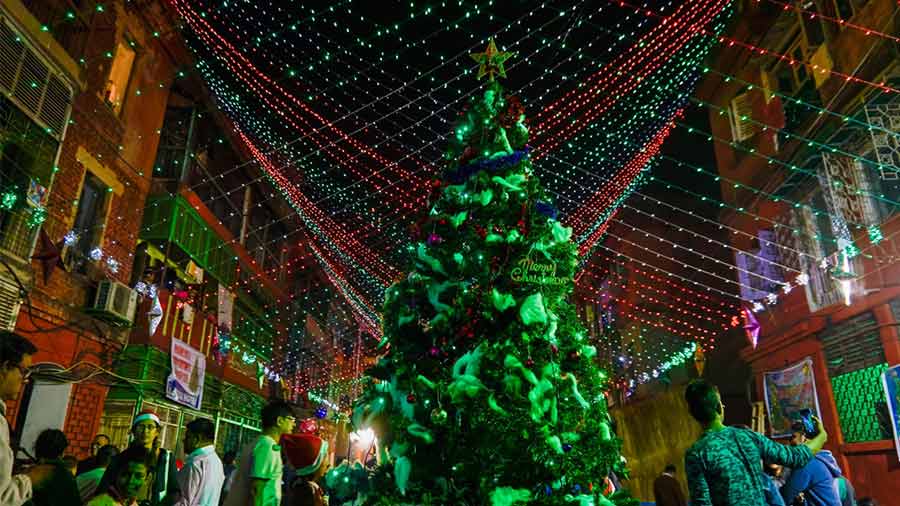Boro Din blurs boundaries in Kolkata.
On Tuesday morning, while touring the heart of the Taltala-Janbazar area on foot for a couple of hours, a group of students and teachers saw how.
For most of them, Christmas meant a decked-out Park Street.
On Tuesday, they got a glimpse of why Christmas has come to be known as Boro Din, or a Big Day of celebration, irrespective of which God you pray to.
They stopped by some historic institutions and some nondescript places that are great bearers of the syncretic culture of Kolkata. They heard personal anecdotes of shared living.
Around 10.45am, the group stood on a narrow road called Pemantle Street in the interiors of Taltala, a five-minute walk from Rafi Ahmed Kidwai Road. The steeple of St Saviour’s Church towered in the background. The Pentecostal Mission Church stood on the opposite side.
Between the two churches is a bakery, almost hidden from the public eye. A handful of men were busy rolling a pile of dough into smaller cones. Some were heating a giant oven.
“Most of the workers here are Muslims. They take orders from Christians in the run-up to Christmas. The Christian families share the cake with everyone. This is the kind of shared living that is ingrained in this city,” said Sabir Ahamed, convener of the Know Your Neighbour campaign, the organisers of the walk.
At Kajol Bakery, a stone’s throw away, Poonam Rosia sat on a chair as Laltu Molla kept mixing flour, eggs and butter in a large cauldron until they formed a thick paste. Then, Rosia poured cherries, raisins and cashew nuts into the mix.
“In the run-up to Christmas, we make around 50- 60kg of cakes every day.
Most customers are local Anglo-Indians,” said Ataul Kaji, from the owners’ family.
The touring team also saw an 86-year-old Jashoda Mishtanna Bhandar, whose “laal doi” is equally loved by Hindus, Muslims and Christians.
The group was made of around 20 students and a handful of teachers of Maulana Azad College, which began its journey in 1926 as Islamia College in the same neighbourhood.
The walk, aptly titled Beyond Park Street, saw Anwar Haque and Brenda Chater Reeves, both residents of the area, sharing with the participants their experiences.
“I grew up here. I would play marbles with all the other children. There was no discrimination. We would send cakes to other homes on Christmas. We would get sewain (vermicelli) on Id.” said Chater.
Haque, 29, has a best friend who is a Jew. “Till my early teens, I never knew he was a Jew. It did not even matter. Not that it still does but I have now realised the importance of celebrating these bonds,” Haque said.
The group stopped by leading centres of Islamic education during the British era.
The Calcutta Madrasah was founded by Warren Hastings in 1780.
In his “Minute on Madrasa”, Hastings said he had been approached by a number of Muslim men of “credit and learning” to set up a madrasa in Kolkata, as the city had “already become the seat of a great empire”.
Since 2007, the institute has been a part of the Taltala campus of Aliah University, housing the theology and Arabic departments. Around 1,200 students — undergraduate and postgraduate — attend classes there.
The Muslim Institute — which came up in 1902 — now runs a tutorial, library, a computer learning centre and a gymnasium and has teams for cricket, football and other sports.
Many of the participants said they walked by these places almost daily but did not realise their role in the history of cosmopolitan Kolkata.
Pabitra Sarkar, academic, linguist and literary critic, said Boro Din was called so because wealthy native families would send expensive gifts to their colonial masters on Christmas.
“The first reference to Boro Din can be found in the poems of Ishwar (Chandra) Gupta (19th century Bengali poet). But over the years, the term has come to mirror the sentiment associated with the festival. It is a big day for everyone,” he said.
A home rented by Kazi Nazrul Islam, the celebrated Bengali poet, was among the stops, as was Baker Hostel.
The participants saw the bust of, and a mini-museum dedicated to, Bangabandhu Sheikh Mujibur Rahman in Room No. 24 of the hostel.
Rahman stayed here for around five years while studying in the erstwhile Islamia College.
“There are so many similarities between different cultures. We must appreciate this shared living. Especially the younger generation. Because the times are different,” said Pritha Chakraborty, assistant professor of English in the college, who was part of the walk.
